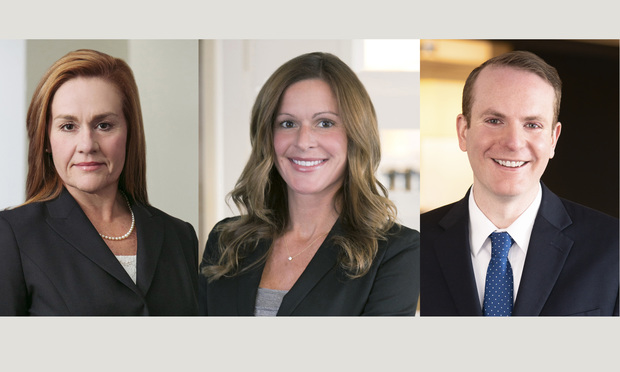How the E-Data Lawyer Challenges Practice Group Silos and Business-as-Usual
By understanding and using client data seamlessly, the e-data lawyer bridges the gap between a mature e-discovery practice and emerging data challenges in other areas of the law.
June 24, 2020 at 01:40 PM
6 minute read
 (l-r) Tess Blair, Tara Lawler, and William Childress, of Morgan, Lewis & Bockius.
(l-r) Tess Blair, Tara Lawler, and William Childress, of Morgan, Lewis & Bockius.
In the first installment of this four-part series published in early March, we described the new kind of lawyer that has emerged from nearly two decades of e-discovery work. The e-discovery lawyer—a Jack-of-all trades who has experience across a broad spectrum of practice areas. She is a tactician, a litigator and a technologist. To succeed in the evolving legal landscape, we discussed how the e-discovery lawyer should not rest on her laurels and must prepare to transform herself into an e-data lawyer—a Jill of even more trades. By understanding and using client data seamlessly, the e-data lawyer bridges the gap between a mature e-discovery practice and emerging data challenges in other areas of the law.
When we wrote the first article in this series, we did not know a global pandemic would lead to the months-long closure of businesses around the country, create a mass migration of employees to a remote work setting, and cause one of the sharpest declines in GDP since the Great Depression. Prior to the major disruptions caused by COVID-19, clients were already increasing their reliance on alternative legal service providers, seeking more automation of legal services, and requiring law firms to operate with more accountability and stricter cost controls.
Although the full impact of the last four months is still uncertain for law firms and their clients, as the economy opens again and workers return to the office, we anticipate the changes that were already afoot in the legal market will accelerate in scale and pace. Clients will look for law firms to do more with less and will ask their lawyers to become solutions architects who are capable of solving current problems and preventing future ones.
In this shifting environment, the e-data lawyer will become a critical part of building a new legal economy fueled by data. To serve clients effectively, the e-data lawyer must embrace a deep understanding of all aspects of data, including data regulation (privacy and security), the benefits and risks data poses to our clients, and how technologies can harness the power of data to solve legal problems. The e-data lawyer will help clients by embracing data-driven processes that lead to superior decision-making.
The e-data attorney expands her practice by thinking of the delivery of legal services differently.
She compliments her broad set of skills as a litigator, technologist, and tactician by surrounding herself with attorneys with multi-disciplinary backgrounds. By collaborating with lawyers in other practice areas, the e-data attorney can gain new perspectives and bring new offerings to the market for clients. In turn, these offerings will create efficiencies, cost-savings and improved outcomes for clients.
In many respects, the e-data lawyer functions like the general contractor building a skyscraper. She brings together an array of specialists to deliver results and has sufficient expertise to collaborate with and manage them. As the volume and complexity of data grows, these teammates use process design and cutting-edge technology to enhance the e-data lawyer's offerings beyond traditional e-discovery.
To fully understand and support the growing universe of data types, sources and uses, the e-data lawyer works closely with data scientists and data analysts. At their core, every case or controversy, due diligence matter or internal investigation is nothing more than a problem or series of problems awaiting solutions. The e-data lawyer understands these solutions can be mined from the large volume of data routinely collected by clients. Through the use of skilled people, proven processes, and new technology, the e-data lawyer turns data into actionable information for her clients. Insight derived from data leads to better decisions and faster resolutions of problems. The e-data lawyer also expands her service offerings with project managers, designers, and software engineers. These skilled professionals design and improve processes and deliver customized solutions and efficiencies for clients.
These professionals not only have a voice on the team, but they have seats at the table and work hand-in-hand with the e-data lawyer to build her practice. With more services and solutions, the e-data lawyer increases her engagement with clients and develops deeper relationships with them. The e-data lawyer's practice becomes the intersection between data processes, legal analysis and technology.
The e-data lawyer also uses her diverse practice to challenge typical practice group silos and a business-as-usual mantra. As the barriers to providing legal services begin to erode in the United States, as they have in Europe, professionals and service providers will compete with lawyers and law firms in the same marketplace. Under these circumstances, the ability of law firms to work through a multi-disciplinary lens will be critical to their success, if not their survival. By collaborating with consultants, vendors, and other professionals, to offer new services, the e-data lawyer positions herself to respond to new competitors.
In addition to seeking out employees with diverse skills, the e-data lawyer also assembles a workforce as diverse as our communities and country. This diversity includes race, gender, age, education, sexual orientation and socio-economic background. Although diversity brings a multitude of benefits, it is no secret that the legal profession has lagged other professions in realizing full diversity. In the future, a fully diverse legal workforce will not be an aspiration but a perquisite for a successful practice. The benefits of a diverse workforce are well-documented and numerous. We know diversity is good for business. Our clients have discovered this to be true. The bottom line of a recent study by the Boston Consulting Group is that diversity increases a company's profits.
Beyond profits, diversity stimulates innovation and for people in the business of solving client problems, this is another means to ensure success. Naturally, people with different backgrounds have different perspectives and approach problems differently. This thinking leads to an array of solutions, which increases the likelihood any problem can be solved for a client. Simply put, diversity enhances diversity of thought, which is essential in a global business environment.
Finally, the e-data lawyer knows diversity for its own sake is not good enough. Inclusion is the action behind diversity efforts. A diverse workforce must be cultivated, given a voice (and heard), and made to feel welcome in the life of a law firm. The full value of a practice group with a range of diverse workers can be unlocked only through inclusivity.
To expand her practice, the e-data lawyer must be capable of solving her clients' most complex problems. She can do so by leveraging the diverse skills of her team to understand and use data. In the next part of the series, we discuss how the e-data lawyer can expand her practice by using technology, her partnerships across industries and process re-engineering with a focus on customer experience and success.
Morgan, Lewis & Bockius partners Tess Blair and Tara Lawler, and associate William Childress, focus their practices on e-discovery, information management and data privacy.
This content has been archived. It is available through our partners, LexisNexis® and Bloomberg Law.
To view this content, please continue to their sites.
Not a Lexis Subscriber?
Subscribe Now
Not a Bloomberg Law Subscriber?
Subscribe Now
NOT FOR REPRINT
© 2025 ALM Global, LLC, All Rights Reserved. Request academic re-use from www.copyright.com. All other uses, submit a request to [email protected]. For more information visit Asset & Logo Licensing.
You Might Like
View All
Law Firms Look to Gen Z for AI Skills, as 'Data Becomes the Oil of Legal'

De-Mystifying the Ethics of the Attorney Transition Process, Part 2
Law Firms Mentioned
Trending Stories
- 1Troutman Pepper, Claiming Ex-Associate's Firing Was Performance Related, Seeks Summary Judgment in Discrimination Suit
- 2Law Firm Fails to Get Punitive Damages From Ex-Client
- 3Over 700 Residents Near 2023 Derailment Sue Norfolk for More Damages
- 4Decision of the Day: Judge Sanctions Attorney for 'Frivolously' Claiming All Nine Personal Injury Categories in Motor Vehicle Case
- 5Second Judge Blocks Trump Federal Funding Freeze
Who Got The Work
J. Brugh Lower of Gibbons has entered an appearance for industrial equipment supplier Devco Corporation in a pending trademark infringement lawsuit. The suit, accusing the defendant of selling knock-off Graco products, was filed Dec. 18 in New Jersey District Court by Rivkin Radler on behalf of Graco Inc. and Graco Minnesota. The case, assigned to U.S. District Judge Zahid N. Quraishi, is 3:24-cv-11294, Graco Inc. et al v. Devco Corporation.
Who Got The Work
Rebecca Maller-Stein and Kent A. Yalowitz of Arnold & Porter Kaye Scholer have entered their appearances for Hanaco Venture Capital and its executives, Lior Prosor and David Frankel, in a pending securities lawsuit. The action, filed on Dec. 24 in New York Southern District Court by Zell, Aron & Co. on behalf of Goldeneye Advisors, accuses the defendants of negligently and fraudulently managing the plaintiff's $1 million investment. The case, assigned to U.S. District Judge Vernon S. Broderick, is 1:24-cv-09918, Goldeneye Advisors, LLC v. Hanaco Venture Capital, Ltd. et al.
Who Got The Work
Attorneys from A&O Shearman has stepped in as defense counsel for Toronto-Dominion Bank and other defendants in a pending securities class action. The suit, filed Dec. 11 in New York Southern District Court by Bleichmar Fonti & Auld, accuses the defendants of concealing the bank's 'pervasive' deficiencies in regards to its compliance with the Bank Secrecy Act and the quality of its anti-money laundering controls. The case, assigned to U.S. District Judge Arun Subramanian, is 1:24-cv-09445, Gonzalez v. The Toronto-Dominion Bank et al.
Who Got The Work
Crown Castle International, a Pennsylvania company providing shared communications infrastructure, has turned to Luke D. Wolf of Gordon Rees Scully Mansukhani to fend off a pending breach-of-contract lawsuit. The court action, filed Nov. 25 in Michigan Eastern District Court by Hooper Hathaway PC on behalf of The Town Residences LLC, accuses Crown Castle of failing to transfer approximately $30,000 in utility payments from T-Mobile in breach of a roof-top lease and assignment agreement. The case, assigned to U.S. District Judge Susan K. Declercq, is 2:24-cv-13131, The Town Residences LLC v. T-Mobile US, Inc. et al.
Who Got The Work
Wilfred P. Coronato and Daniel M. Schwartz of McCarter & English have stepped in as defense counsel to Electrolux Home Products Inc. in a pending product liability lawsuit. The court action, filed Nov. 26 in New York Eastern District Court by Poulos Lopiccolo PC and Nagel Rice LLP on behalf of David Stern, alleges that the defendant's refrigerators’ drawers and shelving repeatedly break and fall apart within months after purchase. The case, assigned to U.S. District Judge Joan M. Azrack, is 2:24-cv-08204, Stern v. Electrolux Home Products, Inc.
Featured Firms
Law Offices of Gary Martin Hays & Associates, P.C.
(470) 294-1674
Law Offices of Mark E. Salomone
(857) 444-6468
Smith & Hassler
(713) 739-1250







